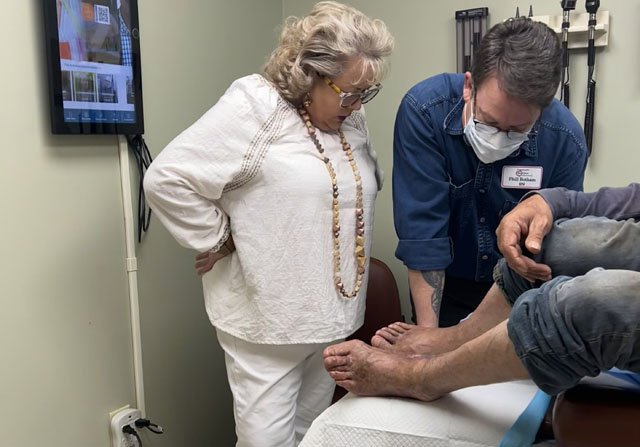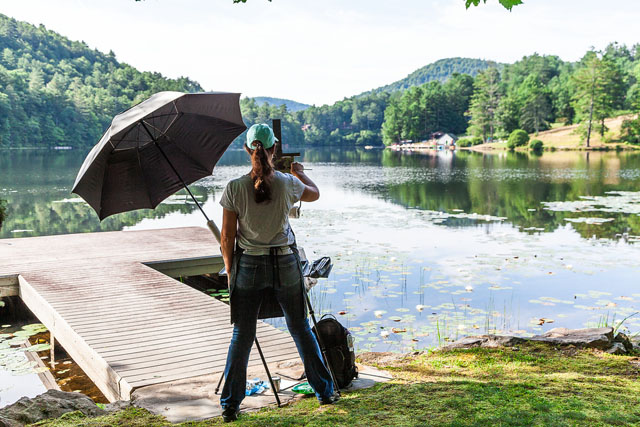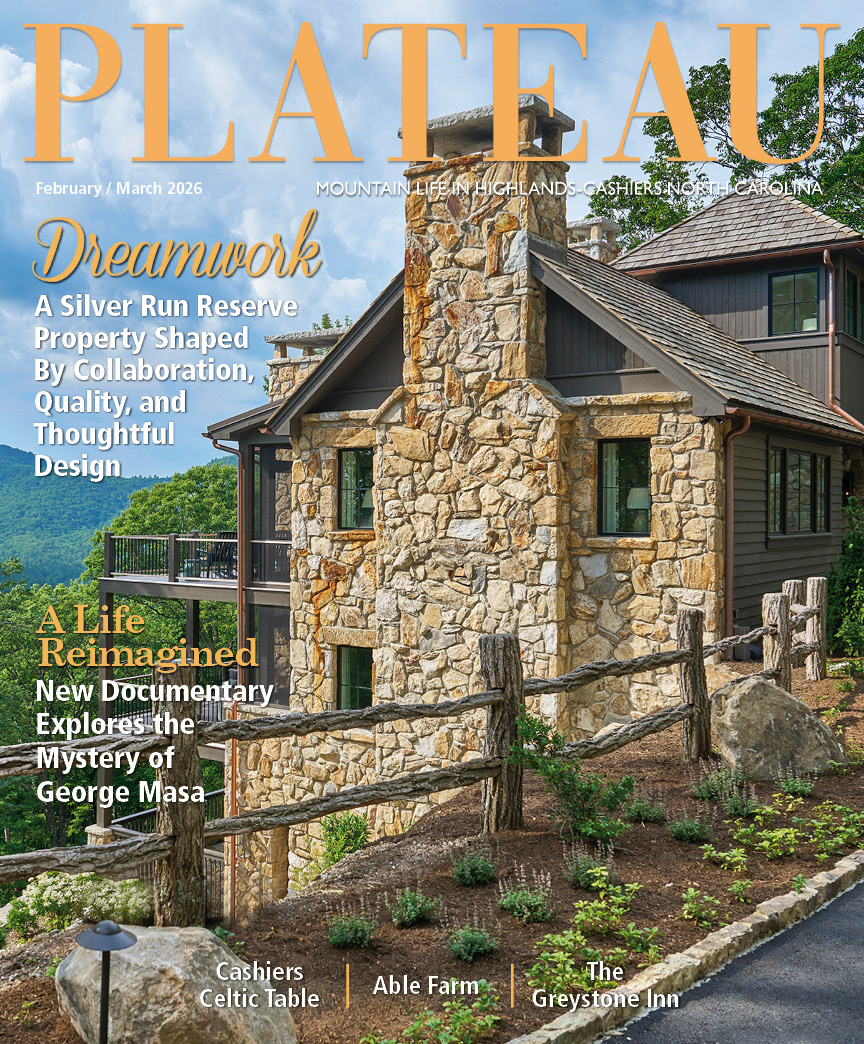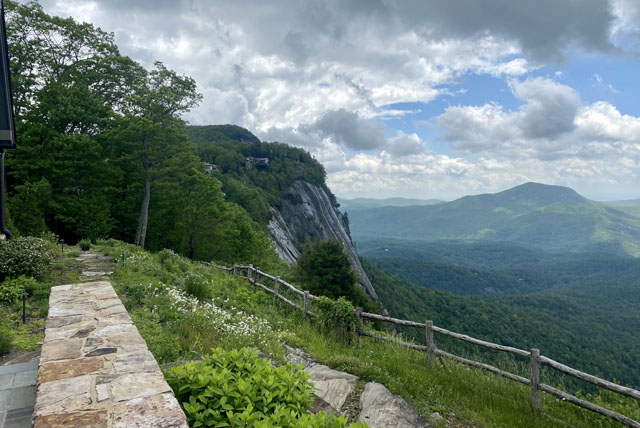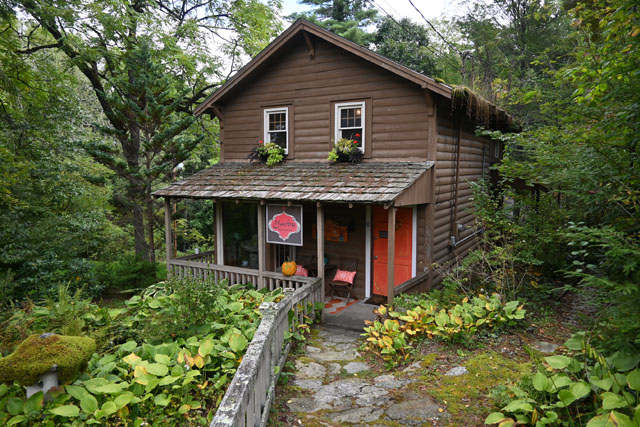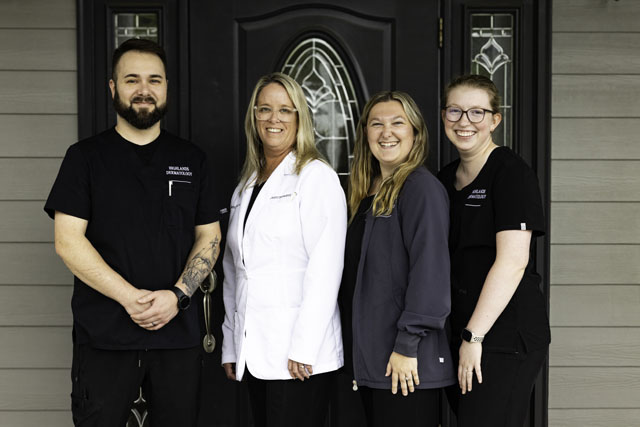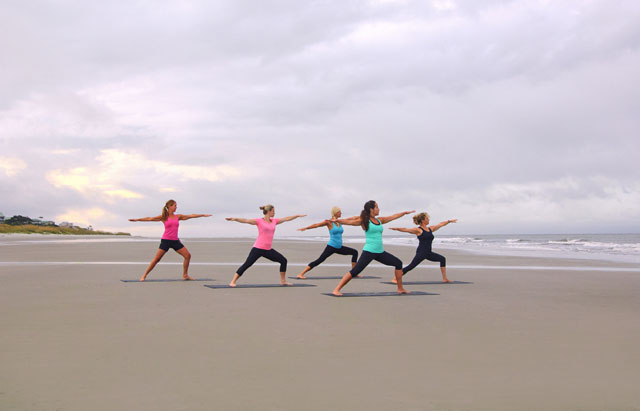Finding Balance
04 Jun 2024
Healing PTSD on the plateau
By Anne Duchac Photos by: Max Paul Franklin

Setting foot on Equinox Ranch, with its 23 peaceful acres in Cullowhee bordered by the Tuckasegee River, is like stepping into another world. Founder Margo Capparelli named the ranch after the two days a year that light and dark are in balance, a concept that she hopes to share with the combat veterans who seek treatment there. “Nine years ago, I had a dream,” says Capparelli, “and I’ve been working on it every day since.” During that time, she’s poured all of her time, energy, skills and personal assets into creating this protected space surrounded by water and wildlife, where veterans suffering from post-traumatic stress disorder and MST (military sexual trauma) can pursue a level of healing that is not available to them in most existing treatment programs.
Capparelli’s vision for the ranch was born when she taught sociology on military bases in Bahrain, Kuwait, Djibouti and Germany, and found herself ingrained in the military community. She also became an informal counselor to many, which ultimately prompted her to return to graduate school and earn a master’s in counseling psychology, focusing her coursework and research on PTSD and effective modalities of treatment. After that, she interned at the Vet Center in Worcester, MA, and then went on to work full-time at the National Veterans Crisis Line. All of these experiences left her determined to find a way of providing a different kind of help for veterans, and an intimate knowledge of exactly how to do it.
Initially, Capparelli sought funding through government and private channels to establish the ranch, but she quickly learned that there are no government grants available specifically for veterans with PTSD or MST. “Our denial about [the prevalence of these traumas] runs through the grant process. It’s like, ‘Oh yeah, this doesn’t exist,’” she says. But after making a connection with philanthropist Lee Woodruff, Lee told her “Honey, ain’t nobody gonna fund your dreams. You’ve got to build it, and then they’ll come around.” Consequently, the ranch was built on Capparelli’s perseverance, on donated services, products and labor, and on volunteer help. 27-year Air Force veteran Lin Davidson has become Capparelli’s right-hand man and co-chair of the construction committee, but he is really a volunteer who saw the vision, showed up to help, and never left. “If you’re not a veteran,” he says, “you can’t understand me. What we do here is veterans helping veterans, and it works.”
Capparelli strives to make the entrance process to Equinox as easy as possible by knocking down barriers that prevent many veterans from getting treatment. Participants don’t have to detail their trauma experiences verbally or in writing, something that can be a deal-breaker. They also don’t need to have an official diagnosis of PTSD, which many try to avoid. The only requirements are that participants are combat veterans and that they provide their discharge paperwork. Other programs can be very selective about what conflict a soldier had to be in, or even how “combat” is defined. “If you’re a Vietnam vet, forget it,” Capparelli says. “There’s hardly anything for them. But those are the people who have been suffering the longest, so why should they be denied help, especially when there are effective treatments available?” She also learned years ago that many who are ready to seek treatment can’t find care for their service dog and therefore will not come, so she gladly allows service dogs at the ranch. The program at Equinox is completely accessible and completely free, including housing, meals and transportation to and from the Asheville airport.
The program spans a year. Sessions are a week long, accommodating up to nine participants. Veterans are encouraged to come for the first session, return home with follow-up care and then come back for another week-long session. “Other programs are done by good people, and they might provide these ‘mountaintop moments.’ But then there’s no follow-up and they face huge problems...I think that discourages them from looking for any further treatment.” After the first session at Equinox, the staff keeps in contact with the veterans, making sure they’re getting the services they need at home, and scheduling them to return for a second session; when they come back, they are in a position to help the new program entrants. Capparelli says, “Here, we’re always going to be small enough to answer the phone and talk to somebody; we get to really know these people.” The veterans keep in touch with each other long after the program officially ends, and those connections are a huge part of what helps them heal.
“It’s working better than I could have dreamed. They come, they eat, they fish, they make music. And for those moments, they’re good.” They experience something new and different, and these moments bring back some of the light that’s gone for veterans who are trapped in darkness. Healing modalities at Equinox include yoga, music and art therapy, jiu-jitsu, drumming, woodworking, tubing down the river, even time in a sweat lodge. Capparelli is game to try many different activities. Her response to how she knows if it works? “If the veterans find it useful.”
Beekeeping is one of the most popular activities at Equinox. The veterans love the bees because there’s so much to learn about them, and they’re all about organization and survival. “Being here is about learning new things, realizing there are cool things in the world. If you’ve been suicidal, you think you know the world and the world is bad. We show them something new and different.”
When they come to the ranch for a session, the veterans immediately become a unit, and everyone does every activity. Many of them have been living in isolation, even within families. They are suffering from debilitating symptoms of PTSD and have no idea that this is common. But Capparelli explains that “when they come to this program, they know they’re all suffering. We get them out of their isolation and show them others who also suffer. It’s amazing how quickly they open up by being around others who get it.” Davidson says that peer counseling is what makes the program so effective, “There’s a commonality among [us], regardless of branch, and here, we take care of each other.”
Davidson’s take on what else makes the program so effective is that “the nature part is therapeutic. Go sit down at the river, there’s that calming water effect. You can toss everything in the water and let it go away. Lots of veterans have similar comments and find it calming and relaxing...It’s not a bunch of people trying to get into your head and tell you what’s wrong with you. You get to access areas you didn’t know you had or weren’t comfortable using.”
Capparelli’s years of experience have taught her that these veterans are going through an extreme identity crisis. “A young kid in his high school chess club goes off to combat and takes on another identity. Then he comes home and has to find a third identity. The best therapy has to do with integrating these identities. You can’t go through war and not be different.” Through the program, veterans discover that it’s okay to tell other people about what they’ve experienced without having to “clean it up.” Talking is how they heal. “When they can tell you the story of their three identities, that’s when they get the most healing – that’s when they’re whole and no longer fragmented.”
A recent participant’s comments show that Capparelli has hit the nail on the head with her program: “This was absolutely an adventure of the mind, spirit and body. Struggling with PTSD is a journey, and having other vets there on the journey was probably the most healing. Being around my brothers again brings on that safety and belongingness.” There is a licensed therapist present during the sessions, but Capparelli sees over and over again that “the real therapy is them being together.”
To learn more and to support the work at Equinox, visit their website at equinoxranch.org or call (828) 356-8307.

